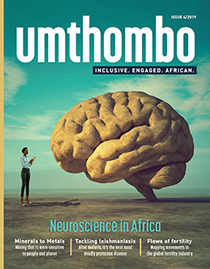Safeguarding the judiciary
27 November 2019 | Story Ambre Nicolson. Photo Blogtrepreneur, Wikimedia. Read time 8 min.
A new set of guidelines and principles – published by the Democratic Governance and Rights Unit (DGRU) at the University of Cape Town (UCT) and the Southern African Chief Justices Forum (SACJF) – are helping to improve the process of judicial officer selection in Southern Africa. Chris Oxtoby, senior researcher for the DGRU, explains why it is essential that these processes remain transparent and accountable.
In 2015, the SACJF met for its annual general meeting and officially committed to creating a set of regional principles and guidelines on the selection and appointment of judges in Africa.
“This was the start of what would become the ‘Lilongwe Principles and Guidelines on the Selection and Appointment of Judicial Officers’: a document created to safeguard the independence and integrity of the judiciary,” explains Oxtoby, who worked with the SACJF to lead research that contributed to the document.
“In some countries, we discovered that there wasn’t really a process at all and that judges were still selected through a ‘tap on the shoulder’ model…”
Oxtoby explains that the Lilongwe Principles were created in two stages: desktop and field research followed by drafting through a special SAJCF sub-committee.
“The first step was to conduct thorough research into the law on paper relating to judicial appointments across the territories studied, which included east and southern Africa,” he says.
“We then went into the field and interviewed all kinds of stakeholders – from recently appointed judges to lawyers and interested parties from civil society – to find out what was happening in practice and what challenges they faced. In the end, we managed to cover eight to 10 countries.”
But the research was not without its challenges.
“In some countries, we discovered that there wasn’t really a process at all and that judges were still selected through a ‘tap on the shoulder’ model in which someone would pretty much just get a phone call saying, ‘You’re now a judge.’”
Some countries presented linguistic challenges, while in other places, the research revealed vastly different views on the same legal system. But according to Oxtoby, the biggest challenge was distilling the vast amount of information into something coherent and useful.
“In this regard, Musa Kika, a UCT PhD researcher, was immensely helpful in conducting an extensive amount of the field work.”
Transparency first and foremost
Once the research was complete, a special subcommittee was formed by the SACJF to draft the principles and guidelines.
The subcommittee was chaired by Justice Makarau of the Supreme Court of Zimbabwe and included Chief Justice Twomey of the Seychelles and retired Chief Justice Othman of Tanzania.
“It was a professional highlight to sit in a room with such pre-eminent justices and discuss the drafting of both the overriding principles of the document as well as the more pragmatic guidelines,” says Oxtoby.
“It was at times difficult to walk a tightrope between being overly dogmatic and allowing for differences in the way these processes played out in different countries.”
“We didn’t want to be too prescriptive, but if you look at other similar international instruments, they tend to be very high level. Whereas we did want to go deeper into the details of processes.
“It was at times difficult to walk a tightrope between being overly dogmatic and allowing for differences in the way these processes played out in different countries. But in the end, I think we found a good balance.”
To illustrate this, Oxtoby explains the differences that exist between countries in the way judicial officers are sourced.
“How do you get a prospective judge to an interview situation?” he asks.
“In South Africa, judges have to be nominated, but other countries allow for direct application or even something that’s more like headhunting. We didn’t specify one of these methods over others in the Lilongwe Principles. But because of the need to be sensitive to the particular circumstances in different countries, we did say that however applicants are sourced, it has to be completely transparent.”
According to Oxtoby, transparency emerged as perhaps the most important principle overall.
“In all these processes, transparency is probably the single most important way that the independence of the judiciary can be safeguarded.”
Home-grown solutions for Africa
The document has been extremely well received since it was published in October 2018, after acceptance at the 2018 SACJF annual general meeting held in Lilongwe, Malawi.
“It is the first document of its kind that deals with best practices for judicial selection.
“It is truly a case of African solutions for African problems. It is based on regional experiences, research and practice,” says Oxtoby.
The document is already being used to challenge questionable appointments in southern Africa. And it has come to the attention of the international community. The Council of Europe has released a report that quoted extensively from the Lilongwe Principles, recommending changes to the judicial appointments process in Cypress.
“It is truly a case of African solutions for African problems. It is based on regional experiences, research and practice.”
The DGRU is planning on using the document in further outreach work, including training workshops in countries where the Lilongwe Principles can be used to identify challenges within a specific legal system.
“There has been a great deal of enthusiasm for the document, and I think this testifies to its usefulness. Hopefully, it will continue to be useful in terms of providing best practice guidelines, more coherence in processes regionally and possibly influencing policy.
“If the Lilongwe Principles result in even incremental change, that will be very worthwhile.”
 This story was published in the fourth issue of Umthombo, a magazine featuring research stories from across the University of Cape Town.
This story was published in the fourth issue of Umthombo, a magazine featuring research stories from across the University of Cape Town. Umthombo is the isiXhosa word for a natural spring of water or fountain. The most notable features of a fountain are its natural occurrence and limitlessness. Umthombo as a name positions the University of Cape Town, and this publication in particular, as a non-depletable well of knowledge.
Read the complete fourth issue online or subscribe and receive new issues in your inbox every few months.
 This work is licensed under a Creative Commons Attribution-NoDerivatives 4.0 International License.
This work is licensed under a Creative Commons Attribution-NoDerivatives 4.0 International License.
Please view the republishing articles page for more information.
Research & innovation





































